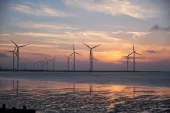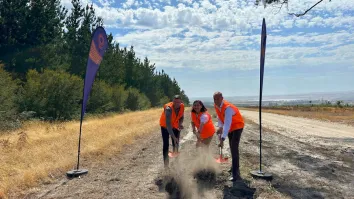
Advancing Clean Fossil Energy in the region through APEC
By Scott M. SmousePower generation in the Asia Pacific region expanded by about 1/3 over the first decade of the new millennium. Some developing countries in the region experienced much higher growth rates than others, while generation barely increased in the developed countries of the region.
For example, according to the Asia Pacific Energy Research Centre (APERC), total power generation grew by about 200% in Vietnam and 175% in China over the last 10 years, while the United States grew by only 3% and Japan by less than 1% during the same period. Most of this growth was fueled by coal supplied from domestic mines or from other countries in the region.
As I’ve written in previous articles, cooperation within the region is critical if we are to address the challenges that coal faces.
I want to highlight the work ongoing under the Asia-Pacific Economic Cooperation on these issues. APEC, which has 21 member economies with borders on the Pacific Ocean, is a regional economic forum set up in 1989. Its primary goal is to support sustainable economic growth and prosperity in the region, via activities aimed at trade and investment liberalization, business facilitation, and economic and technical cooperation.
APEC’s Leaders and Senior Officials are advised by a number of Working Groups covering the principal facets of economic activity. The Energy Working Group (EWG), launched in 1990, seeks to maximize the energy sector’s contribution to the region’s economy, while mitigating the environmental effects of energy supply and use.
The EWG is assisted by four Expert Groups focusing on different energy areas, including an Expert Group on Clean Fossil Energy (EGCFE, www.egcfe.ewg.apec.org). The EGCFE’s mission is to encourage the use of clean fuels and energy technologies that will contribute to sound economic and environmental performance, with emphasis on increasing the efficiency of fossil energy production and use, and mitigating local, regional, and global environmental impacts. It promotes clean fossil energy options through a variety of activities, including studies on more efficient clean fossil energy technologies and related policy and regulatory topics, and seminars and workshops.
Promoting Clean and Efficient Fossil Energy
Rapid economic and energy demand growth in a number of developing APEC economies is necessitating major expansions in energy infra structure, especially power gen eration. Coal is expected to account for more than a quarter of new generating capacity in the APEC region during the next two decades. With growing concern about global climate change, the steady increase in CO2 emissions from the region’s rapidly expanding coal-fired power generation sector provides additional motivation for EGCFE’s supply-side efficiency and emission reduction thrust.
To minimize coal’s environmental impacts, it is important to employ tech nologies that increase the efficiency of generation from coal to the maximum extent possible consistent with cost/reliability/operability goals. A number of clean coal technologies (CCTs) have been developed and demonstrated that offer significantly higher efficiencies and lower emissions than conventional technologies that are widely used through out the region.
While the EGCFE’s vibrant program includes work on other fossil fuels, including natural gas LNG, and unconventional gas, its central effort has been on coal.
The Group has focused on coal since its establishment, especially activities to accelerate the uptake of CCTs for new plants in developing APEC economies, where coal use is on a rapid growth path, and to improve the performance of existing plants, including reduced emissions, through power plant upgrading and refurbishment and better environmental monitoring. For example, recent EGCFE studies have covered:
- Regulatory and permitting issues related to CCT implementation
- Technology status and project development risks for new CCT plants
- Trade, regulatory, and financing barriers impeding CCT projects
- Incentives to promote early deployment of commercial CCTs
The EGCFE has been increasingly emphasizing carbon capture and storage (CCS) as a means to mitigate CO2 emissions from coal power generation. Although CCS is still at a relatively early stage even in developed economies, the projected growth of CO2 emissions in developing APEC economies warrants an early effort to provide them with information needed for when CCS may become necessary and possibly urgent. CCS projects supported by APEC through the EGCFE have included:
- Planning and cost assessment guidelines for making new plants in developing APEC economies CO2 capture ready
- A ongoing study on CCS permitting
- A series of CCS capacity building workshops in APEC economies (China, Indonesia, Korea, and Mexico) that delivered training aimed at policymakers and their experts. This work continues with a recent workshop in Vietnam with the Asian Development Bank. Two more events are being planned in the region.
Without specific regulatory requirements and/or some form of carbon pricing, CCS deployment would need financial support. However, situations where disposition of CO2 can serve a purpose can render projects more economically attractive. A recently approved EGCFE project will examine the feasibility of carbon capture, utilization and storage (CCUS), focusing the CO2 reused for enhanced oil or gas recovery.
This combination can greatly improve the economics and provide an incentive for demonstration of the technologies at operational scale. This project will be conducted in cooperation with the Carbon Sequestration Leadership Forum (CSLF), whose focus has recently been broadened to include CCUS. A follow-on regional workshop will be proposed.
APEC Clean Fossil Energy Technology and Policy Seminars
Another important vehicle for information sharing is the EGCFE Clean Fossil Energy Technology and Policy Seminar, which is held annually. Through presentations and panel discussions, the latest developments in the region related to CCTs, coal demand and supply, and coal policy will be shared. The proceedings from past seminars can be downloaded from the EGCFE’s Events web page. The next will be held February 22-24, 2012, in the Gold Coast, Australia.
Getting Involved in APEC Clean Fossil Energy Projects
The EGCFE’s projects, which are overseen by the Group’s representatives or experts who they’ve designated, are carried out by consultants selected competitively through a Request for Proposals (RFP) posted on APEC websites. Consultants interested in proposing for EGCFE projects are encouraged to keep an eye on the APEC and EGCFE websites.




















 Advertise
Advertise







